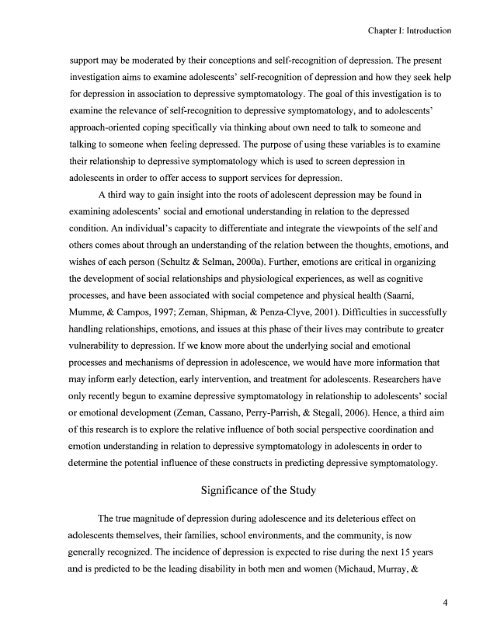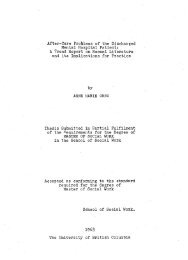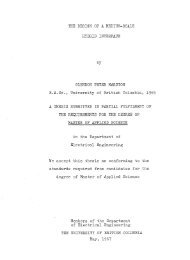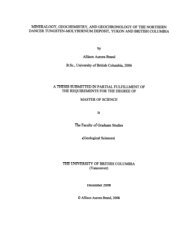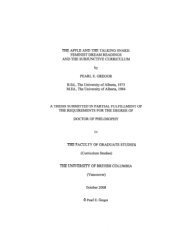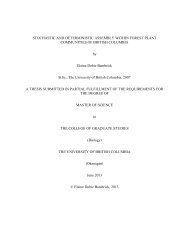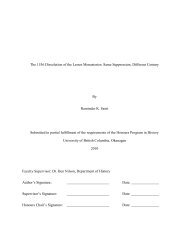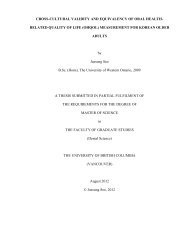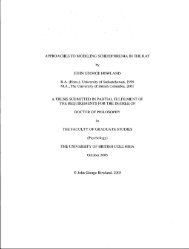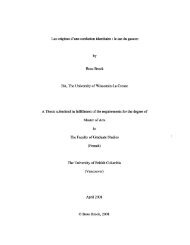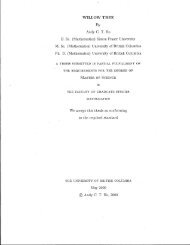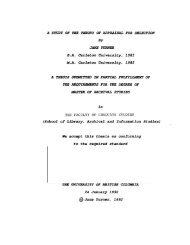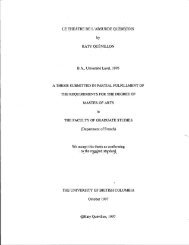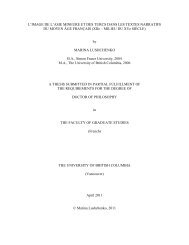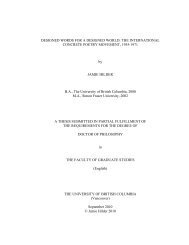how do adolescents define depression? - cIRcle - University of ...
how do adolescents define depression? - cIRcle - University of ...
how do adolescents define depression? - cIRcle - University of ...
You also want an ePaper? Increase the reach of your titles
YUMPU automatically turns print PDFs into web optimized ePapers that Google loves.
Chapter I: Introduction<br />
support may be moderated by their conceptions and self-recognition <strong>of</strong> <strong>depression</strong>. The present<br />
investigation aims to examine a<strong>do</strong>lescents' self-recognition <strong>of</strong> <strong>depression</strong> and <strong>how</strong> they seek help<br />
for <strong>depression</strong> in association to depressive symptomatology. The goal <strong>of</strong> this investigation is to<br />
examine the relevance <strong>of</strong> self-recognition to depressive symptomatology, and to a<strong>do</strong>lescents'<br />
approach-oriented coping specifically via thinking about own need to talk to someone and<br />
talking to someone when feeling depressed. The purpose <strong>of</strong> using these variables is to examine<br />
their relationship to depressive symptomatology which is used to screen <strong>depression</strong> in<br />
a<strong>do</strong>lescents in order to <strong>of</strong>fer access to support services for <strong>depression</strong>.<br />
A third way to gain insight into the roots <strong>of</strong> a<strong>do</strong>lescent <strong>depression</strong> may be found in<br />
examining a<strong>do</strong>lescents' social and emotional understanding in relation to the depressed<br />
condition. An individual's capacity to differentiate and integrate the viewpoints <strong>of</strong> the self and<br />
others comes about through an understanding <strong>of</strong> the relation between the thoughts, emotions, and<br />
wishes <strong>of</strong> each person (Schultz & Selman, 2000a). Further, emotions are critical in organizing<br />
the development <strong>of</strong> social relationships and physiological experiences, as well as cognitive<br />
processes, and have been associated with social competence and physical health (Saarni,<br />
Mumme, & Campos, 1997; Zeman, Shipman, & Penza-Clyve, 2001). Difficulties in successfully<br />
handling relationships, emotions, and issues at this phase <strong>of</strong> their lives may contribute to greater<br />
vulnerability to <strong>depression</strong>. If we know more about the underlying social and emotional<br />
processes and mechanisms <strong>of</strong> <strong>depression</strong> in a<strong>do</strong>lescence, we would have more information that<br />
may inform early detection, early intervention, and treatment for a<strong>do</strong>lescents. Researchers have<br />
only recently begun to examine depressive symptomatology in relationship to a<strong>do</strong>lescents' social<br />
or emotional development (Zeman, Cassano, Perry-Parrish, & Stegall, 2006). Hence, a third aim<br />
<strong>of</strong> this research is to explore the relative influence <strong>of</strong> both social perspective coordination and<br />
emotion understanding in relation to depressive symptomatology in a<strong>do</strong>lescents in order to<br />
determine the potential influence <strong>of</strong> these constructs in predicting depressive symptomatology.<br />
Significance <strong>of</strong> the Study<br />
The true magnitude <strong>of</strong> <strong>depression</strong> during a<strong>do</strong>lescence and its deleterious effect on<br />
a<strong>do</strong>lescents themselves, their families, school environments, and the community, is now<br />
generally recognized. The incidence <strong>of</strong> <strong>depression</strong> is expected to rise during the next 15 years<br />
and is predicted to be the leading disability in both men and women (Michaud, Murray, &<br />
4


